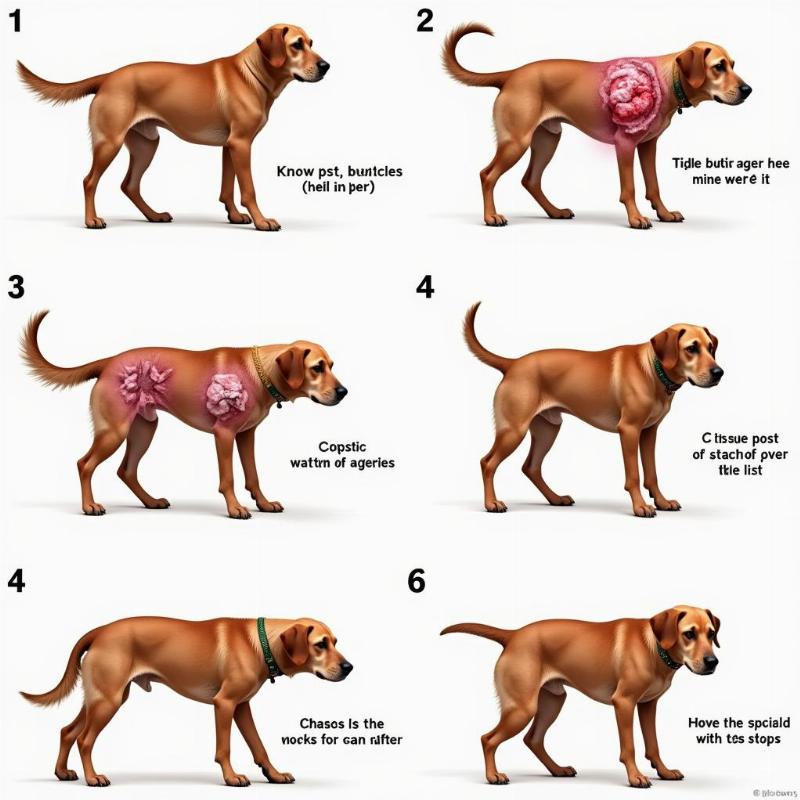Neo Pred powder is a commonly used medication for dogs, often prescribed for skin conditions. Many dog owners wonder about its wound-healing properties, specifically if it dries up wounds. While Neo Pred powder isn’t typically used for this purpose, understanding its effects and appropriate applications is crucial for responsible pet care. Let’s delve into the uses of Neo Pred, its potential impact on wound healing, and when you should consult your veterinarian.
Understanding Neo Pred Powder and its Uses
Neo Pred powder contains a combination of neomycin, an antibiotic, and prednisolone, a steroid. This combination is effective in treating various skin infections and inflammatory conditions in dogs. Neomycin combats bacterial infections, while prednisolone reduces inflammation and itching. This makes Neo Pred a useful tool in managing hot spots, allergic reactions, and certain types of dermatitis.
Neo Pred Powder for Wound Drying: Myth vs. Reality
While Neo Pred powder might seem like a good option for drying up wounds due to its powder form, it’s not typically recommended for this purpose. The steroid component can actually hinder the natural healing process. While prednisolone reduces inflammation, it can also suppress the immune system, potentially slowing down tissue repair and increasing the risk of infection. Direct application to open wounds is generally discouraged.
 Different stages of dog wound healing
Different stages of dog wound healing
When to Consult a Veterinarian
If your dog has a wound, consulting your veterinarian is always the best course of action. They can assess the wound’s severity, identify the underlying cause, and recommend appropriate treatment. Self-treating with Neo Pred powder or other medications without veterinary guidance can be detrimental and delay healing.
What if My Veterinarian Prescribes Neo Pred?
Your veterinarian might prescribe Neo Pred powder for skin conditions around a wound, but not directly on the wound itself. For instance, if the surrounding skin is inflamed or infected, Neo Pred can help manage those issues and create a more conducive environment for healing. Always follow your veterinarian’s instructions precisely.
Proper Wound Care for Dogs
Proper wound care involves keeping the wound clean, preventing infection, and promoting healing. This typically includes cleaning the wound with a mild antiseptic solution, applying a sterile dressing if necessary, and preventing your dog from licking or chewing the area. Your veterinarian may also recommend pain medication or other treatments depending on the wound’s nature and your dog’s individual needs.
Conclusion
While Neo Pred powder is a valuable medication for specific skin conditions in dogs, it’s not a suitable solution for drying up wounds. In fact, improper use can hinder healing and increase the risk of complications. Always consult your veterinarian for appropriate wound care and treatment recommendations. They can guide you on the best course of action for your furry friend’s specific needs. Don’t rely on home remedies – professional veterinary care is essential for ensuring your dog’s health and well-being.
FAQ
- Can I use expired Neo Pred powder on my dog? Never use expired medication. Dispose of expired Neo Pred powder properly and consult your veterinarian for a fresh prescription.
- What are the side effects of Neo Pred powder in dogs? Potential side effects include increased thirst, increased urination, and changes in appetite. If you notice any unusual symptoms, contact your veterinarian.
- How should I store Neo Pred powder? Store Neo Pred powder in a cool, dry place away from direct sunlight and out of reach of children and pets.
- Can I use human Neo Pred powder on my dog? No, never use human medication on your dog without consulting your veterinarian. Formulations and dosages are different and can be harmful to pets.
- My dog licked off the Neo Pred powder. What should I do? Contact your veterinarian immediately and follow their instructions.
- How long does it take for a dog’s wound to heal? Healing time varies depending on the wound’s size, location, and severity. Your veterinarian can provide a more accurate estimate based on your dog’s individual case.
- What are signs of a wound infection in dogs? Signs of infection include redness, swelling, pus, increased pain, and a foul odor.
Beautdogs.us is your premier online resource for comprehensive dog care information, breed-specific advice, and access to the latest products. Whether you’re a new dog owner or a seasoned enthusiast, Beautdogs.us provides expert guidance and valuable resources to ensure your canine companion thrives. Contact us today at [email protected] or call us at +1 501-555-7529. Beautdogs.us is dedicated to helping you provide the best possible care for your beloved dog.